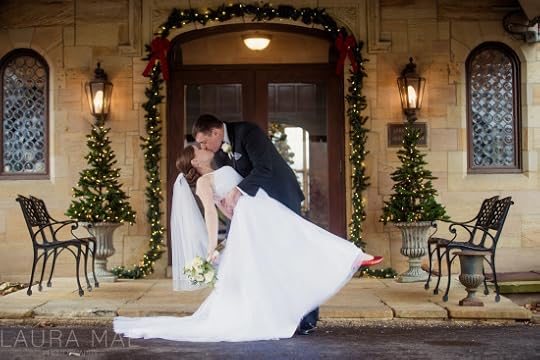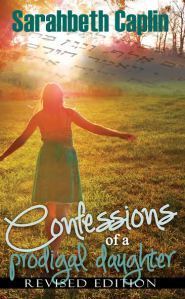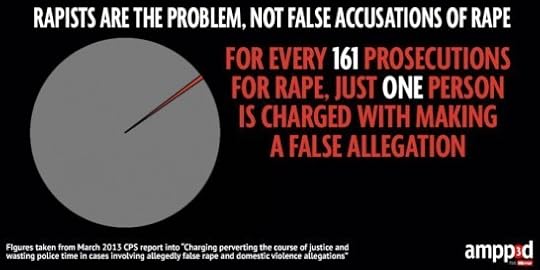Sarahbeth Caplin's Blog, page 53
December 30, 2014
What a doctor’s visit revealed about my Jewish identity
The other day I went to a brand new doctor to renew a prescription. If you’ve ever moved out of your home state, you know what a royal pain it is to find brand new doctors, and having to fill out family history forms all over again. I’m sure these questionnaires are more or less the same at most doctor’s offices, but this one had one question I wasn’t expecting, and have rarely seen before:
Does your family have any Ashkenazi Jewish background?
I hesitated, but I’m not sure why; my beliefs are irrelevant as far as family history is concerned, and I’m already aware that the Jewish community is more at risk for certain cancers and other medical conditions than others. So I checked ‘yes.’
Funny how I was there to discuss a completely unrelated medication, yet for most of the visit, I sat at the mercy of the doctor who handed me pamphlet after pamphlet about genetic testing, and seemed horrified that I had never been tested for these cancer genes before. I tried to laugh it off by saying, “Well, I didn’t see a point if I’m not having kids, I’m fine with having cats as kids for now,” but he failed to understand or acknowledge my humor. What I really felt like saying was, Yes doctor, I am already aware that my family is genetically fucked. The mood continued to go south when the doctor asked about the deaths of my paternal grandparents – both from cancer – and then about my father’s health. As you can imagine, I tensed up rather quickly before responding, “He died of cancer too.”
All that just to renew my birth control. Geez Louise. Should have inquired about Xanax while I was at it.
What is the point of writing about this? Because it all started by checking off “Jewish” on the medical intake form, reminding me that regardless of what I believe spiritually, one cannot take the biological Judaism out of a person.
I always found it strange that my family religion has both spiritual and ethnic components, and most Jews (in America, at least) identify with Judaism on more of a cultural level. I’d say that’s definitely true in my case – cultural Judaism remains a strong and critical part of my identity as a person, if not my spiritual identity. Jewish-isms were the language of my mother and maternal grandmother growing up, and it always makes my heart sink a little when I have to explain the meaning of “chutzpah” or “schlepping” to a gentile, or why my “Jewish Penicillin” soup bowl is so funny.
But more than that, it’s telling how I had to embark on this roundabout journey through Christianity in order to understand that the things that bothered me most about Judaism are the same things I miss most about it today. It used to frustrate me that Judaism couldn’t seem to make up its mind on issues such as whether there’s an afterlife (and who gets to go where), and even social issues such as abortion and premarital sex. The continuum of liberal and conservative Judaism is quite long and diverse; there are, quite frankly, as many answers to those questions as there are Jews.
But it’s hard not to respect a faith that has learned to embrace mystery and uncertainty. You would be hard-pressed to find people like that in evangelical Christianity, and if they are out there, they are likely in the closet for fear of being outed as heretics.
I’ll come out and say it for added emphasis: I miss Judaism. I miss being Jewish. I don’t know what this means for me, though, as I doubt I’ll ever walk away from Jesus, even if I walk away from church and other Christians. The people I know who identify as “both” are from interfaith families whose parents compromised by having a Christmas tree and a menorah coexist in the same living room. The other “both” group is Messianic Judaism, a movement that simply isn’t for me. Spiritually speaking, it is impossible for one to be “both,” as these two religions teach very different things. But as far as the culture is concerned; the history, the medical aspects…those are my last and only straws.
I don’t mean to imply that Judaism is a back-up plan if Christianity doesn’t work out. Still, it is comforting to know that while I may feel like a spiritual orphan at times, I’ll never be spiritually homeless. I will always belong somewhere.
Filed under: Religion Tagged: cancer, Christian culture, Christianity, hell, Judaism

December 27, 2014
Shifting faith and understanding grace
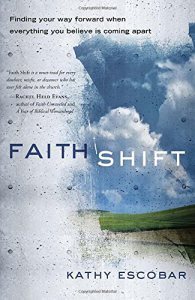 I’ve never blogged through a book before, but I’m considering doing that with Faith Shift by Kathy Escobar. I’ve been looking forward to reading it for a long time, but as a devout bookworm with OCD, I not only couldn’t set aside the book(s) I was currently reading to start this one, I had to read all my new books in exactly the order I bought them (otherwise I’d just hurt their feelings).
I’ve never blogged through a book before, but I’m considering doing that with Faith Shift by Kathy Escobar. I’ve been looking forward to reading it for a long time, but as a devout bookworm with OCD, I not only couldn’t set aside the book(s) I was currently reading to start this one, I had to read all my new books in exactly the order I bought them (otherwise I’d just hurt their feelings).
FINALLY, the time has come for me to read this, and I can tell it’s going to be good because I’m only twenty pages in and had to set it down as my brain started swimming with blog ideas.
If you couldn’t guess by the title, Faith Shift is a book for people going through transition. It’s not a Christian-y ‘self help’ book or 200-page sermon disguised as a devotional. Escobar wastes no time by asking on page 4: “Do you feel tired and frustrated when you go to church or read your bible? Have you experienced a significant shift in your theology and lost some relationships because of it?” That’s just the beginning; by page 5 I itched to start writing, but forced myself to at least finish the chapter first.
By the end of the chapter I realized something important: while there’s some merit in going through the motions of religion even if your heart isn’t in it, it’s just not healthy to do that for an extended period of time. “Keep calm and faith on” only works so much, and I’ve reached a point where my empty expressions of faith aren’t fooling God. It almost feels disrespectful to keep acting as if I am.
So I put down my Bible. Closed my prayer journal. It’s been months since I’ve cracked open either one. This is not permanent (at least I hope it’s not) but all my pages of complaining made me feel more stressed and anxious, not less. If that’s what “laying your problems at the foot of the cross” is supposed to look like, I guess I wasn’t doing it right.
In addition, I hid the Facebook updates of acquaintances who praised God for cheap cars and lowered gas prices. I withdrew from closer friends whose strong faith I once admired, but now discouraged and disillusioned me; at times even threatened me.
It’s hard to pinpoint exactly when this started, but I’m going to say it was somewhere during my “gap year” between college and grad school, and I had this crazy idea that enrolling in seminary would help strengthen my faith. One year and $30,000 later, I dropped out, and that’s sort of where Confessions of a Prodigal Daughter leaves off.
At the time of publication, I wasn’t in a place to begin sorting through the confusion and frustration of being in small groups with Bible Belt-ers who spoke as if they had never interacted with anyone outside their faith before; people who sincerely believed depression was an excuse to sin. I also wasn’t in a place to deal with the harassment from another student who didn’t know how to take “no” for an answer (which is enough of a trigger by itself), and later called me a heretic for expressing doubts about the meaning of a particular bible verse. In the middle of a lecture, no less.
I hesitate to call the entire seminary experience a mistake, because through it I did make a few genuine, solid friendships. But whatever it was, it was awfully expensive, and something I probably wouldn’t have tried if I had the foresight of how it would end. But that’s how life often works; what can you do?
From there, if you’ve kept up with this blog for the last few months, you know my father died of cancer. Within a month, my childhood pet was gone, too. Two months later I got married. Roller coaster much? Definitely. Through all that muck there were friends who reminded me how much they loved me, and I’m so grateful for them. But there were also people who revealed a side I had never seen before that caused a break of trust: people who didn’t seem to care much about my emotional well-being, but only wanted to know if my father was “saved.” I turned away from those people, even if their intentions came from a good place. It just seemed to me that hell wasn’t reserved for after death – it was happening right in my living room. I couldn’t stand to be reminded of it anymore.
If you’ve read Confessions, you know that redemption – God making new and beautiful things out of broken pieces – was a big part of what attracted me to Christianity in the first place. It’s a different kind of philosophy than “everything happens for a reason.”
I’m also enchanted by the notion that one need not be Christian, or even religious, to be used by God. One of Dad’s last requests was to use some of his life insurance money to help my brother and I pay off our student loans. The biblical parallel is not lost on me: with Dad’s literal death he gave us (financial) freedom. Christians are familiar with this idea of grace from reading Scripture, but not many experience it directly. I don’t want to sound self-righteous when I say this, but it makes me wonder if God is still trying to get my attention. If he’s still trying to tell me Hey, I’m still here. Your father’s death was devastating, but I won’t let it go to waste.
Of course, I question the type of God who allows these awful things to happen in the first place. But that’s another subject for another post: one that I hope Escobar will address in a later chapter.
Filed under: Religion Tagged: Author Sarahbeth Caplin, cancer, Christian culture, Christianity, Confessions of a Prodigal Daughter, depression, Facebook, grief, hell

December 26, 2014
A Year in Review (of books)
With less than a week left of 2014, it’s time to review 1% of the year’s favorite books and authors to watch. But let’s be honest: a review of every book I read and liked this year would be another book in itself, so I painstakingly narrowed this list down to a Top Five.
5) THE CHOICE by AJ Adwen
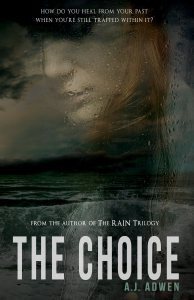 THE CHOICE is a gut-wrenching story of a teenage girl who finds herself in a dark place that no young woman should ever know. At the same time, it’s also a love story, with a message of redemption for those who have been hurt by life and don’t know whether they can trust anyone again.
THE CHOICE is a gut-wrenching story of a teenage girl who finds herself in a dark place that no young woman should ever know. At the same time, it’s also a love story, with a message of redemption for those who have been hurt by life and don’t know whether they can trust anyone again.
There are no easy answers or heavy-handed morals, which I prefer in books that tackle difficult topics. It’s rare for me to read a book that explores a dark subject like rape so realistically and responsibly, without getting unnecessarily graphic. That’s not to say I wasn’t somewhat triggered by the content, but that’s a testament to the power and beauty of Adwen’s writing.
4) WISHING WELL by Kaitlyn Oruska
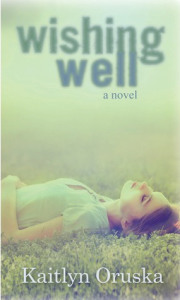 Kaitlyn Oruska tackles the issue of substance abuse, and the friends and family members struggling to understand it, with wisdom and grace. The characters are flawed, yet believable. There are so many questions implicitly asked of readers: how do you love someone when you don’t fully understand what they are going through? When they aren’t acting very lovable? When you wonder why you should still remain involved in their lives? Do you run away, or do you stay? And how far would you go to remain loyal, even if it turns your own life upside down?
Kaitlyn Oruska tackles the issue of substance abuse, and the friends and family members struggling to understand it, with wisdom and grace. The characters are flawed, yet believable. There are so many questions implicitly asked of readers: how do you love someone when you don’t fully understand what they are going through? When they aren’t acting very lovable? When you wonder why you should still remain involved in their lives? Do you run away, or do you stay? And how far would you go to remain loyal, even if it turns your own life upside down?
3) THE BIBLE TELLS ME SO by Peter Enns
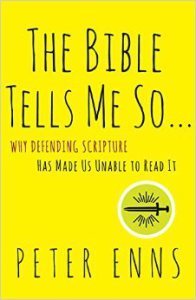 I have great respect for Christians – scholars, no less – who openly wrestle with doubt, and are unafraid to address the difficult questions that many would prefer to sweep under the rug. Questions like why God permits and even orders genocide, and why the Scriptures seem full of contradictions. At the same time, if the Bible is a series of documents inspired by God, it does not require a human defense. Rather, it can stand on its own merit.
I have great respect for Christians – scholars, no less – who openly wrestle with doubt, and are unafraid to address the difficult questions that many would prefer to sweep under the rug. Questions like why God permits and even orders genocide, and why the Scriptures seem full of contradictions. At the same time, if the Bible is a series of documents inspired by God, it does not require a human defense. Rather, it can stand on its own merit.
While I appreciate the honesty of this book, I wasn’t completely satisfied by Enns’ answers (not that I expected there to be any, considering the vast number of scholars who have wrestled with the same texts throughout the last two thousand years and still can’t seem to make up their minds). Still, this is a great book for discussion, and I wish I read through it with a small group instead of on my own. Perhaps one day.
2) QUIET by Susan Cain
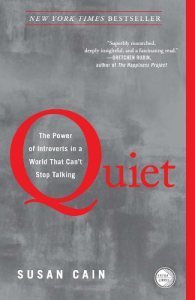 I’m generally skeptical of ‘blockbuster books’ – the kind that every media outlet is talking about, that are displayed front and center at every grocery store and airport newsstand. But it was hard to resist a book addressing a commonly misunderstood demographic that I fall into – introverts – so I had to pick it up. And I’m glad I did.
I’m generally skeptical of ‘blockbuster books’ – the kind that every media outlet is talking about, that are displayed front and center at every grocery store and airport newsstand. But it was hard to resist a book addressing a commonly misunderstood demographic that I fall into – introverts – so I had to pick it up. And I’m glad I did.
This a book I wish was available years ago, when I struggled to maintain a ‘people presence’ while working in retail under a boss who kept telling me I wasn’t smiley, perky, or talky enough (and I was genuinely trying my hardest to be that way), and while volunteering for the ‘meet and greet’ team at church to get out of my comfort zone. I’ve wondered if something was wrong with me for having a fear of talking to strangers (usually businesses) over the phone, hating to be the first to introduce myself, and feeling worn out after being around large groups of people for too long.
At the same time, I’m fairly decent at public speaking (in limited amounts) which Cain says is not uncommon for a lot of introverts. In fact, some of the most famous actors and creative types – people who make a living performing in front of other people – are introverted. In a world that tends to favor the extroverted personality, this is a necessary book that everyone should read.
1) THE CREATION OF ANNE BOLEYN by Susan Bordo
 I guess it goes without saying that Anne Boleyn is one of my favorite historical figures: mysterious, controversial, ambitious, and woefully misunderstood. This book addresses the ways that Anne has essentially been ‘recreated’ depending on the bias of whomever is telling her story: historical fiction novelists, TV producers, playwrights. She is someone who can be painted in a number of ways: martyr, whore, victim, feminist icon, ‘mean girl,’ and more. How can you not be intrigued by someone like that?
I guess it goes without saying that Anne Boleyn is one of my favorite historical figures: mysterious, controversial, ambitious, and woefully misunderstood. This book addresses the ways that Anne has essentially been ‘recreated’ depending on the bias of whomever is telling her story: historical fiction novelists, TV producers, playwrights. She is someone who can be painted in a number of ways: martyr, whore, victim, feminist icon, ‘mean girl,’ and more. How can you not be intrigued by someone like that?
This book is not so much a biography as it is a cultural history, and it’s a conversational, at times even humorous read – not like a textbook.
So, have you read any of these? What are some of your favorite books from 2014?
Filed under: Feminism, Other stuff, Rape Culture, Religion, Writing & Publishing Tagged: Christian culture, Christianity, Controversy, Feminism

December 24, 2014
Is it selfish, or is it self-care?
On the third night of our honeymoon, we discovered a piano bar at the resort. We could request songs, sip daiquiris, and just enjoy the fact that we could stay out as late as we wanted, sleep in as late as we wanted, and not have to worry about work for a while.
I was somewhere around my third daiquiri when the couple next to us requested Fix You by Coldplay…and that’s when the fun sort of crashed. I associate songs with many experiences in life, positive and negative, and Fix You is one of those songs that never fails to trigger me: And the tears come streaming down your face/When you lose something you can’t replace/When you love someone but it goes to waste/Could it be worse?
It was a song I played on repeat almost every night this past summer, because the lyrics are so spot-on, yet vague enough to fit almost any situation.
In my case, it perfectly described how I felt about losing Dad. A gorgeous song, to be sure, but I had to wonder why someone would request it at a Sandals resort. Sad songs do not belong on vacation! I felt genuinely happy on our trip – a feeling I’ve struggled very much to recover – but that song? I couldn’t listen to it. Not then.
I’m sure it’s only because of the daiquiris that I opened my big mouth and blurted, “Why that song?” The woman who made the request stared at me blankly. “You don’t like it?” she asked, dumbfounded.
“No, I love that song,” I responded. “I just don’t feel like slitting my wrists on my honeymoon.” And that was the point where Josh whisked me away and said, “You know, maybe Tipsy Beth shouldn’t be allowed out in public.”
And he had a point – not about being tipsy in public, which I never do (it was an all-inclusive resort, in my defense), but about taking my issues out on unsuspecting people who don’t need to be subjected to my inner baggage. I have been depressed, angry, and grieving deeply, all the while knowing that there comes a point when those problems can no longer be used as an excuse to turn off my mental filter. There’s an unspoken “grace period” for people going through hard times, when the bereaved are more likely to be forgiven for saying stupid things, but that grace period can’t last forever.
I’ve been around people who let their grief consume them; who act as if they are the only ones to ever experience a certain kind of tragedy. I have also been that person. I’m slowly coming to terms with the fact that loss is part of the human experience, and while I’ve been extremely blessed for most of my life, I’m not immune to suffering (and yes, I am aware of how much that statement exposes my utmost privilege). I’m fortunate to have had only a couple big losses in 26 years.
As I prepare to leave my Hermit Hole and re-enter the world again, I find myself asking the following question: Is this action selfish, or is it self-care? If it’s the former, I’m grateful to have people on the inside, like my husband and a few close friends, who know me well enough to keep me straight and use tough love if necessary.
The piano guy did play that song. I ended up leaving the bar and pacing outside in circles while looking at wedding pictures on my phone to help stay present. I probably should have apologized to that couple, but they were gone by the time I came back. They will never know that my outburst wasn’t because I’m a rude person all around, but because of trouble getting on a train out of Trigger Town.
Filed under: Other stuff Tagged: cancer, depression, grief

December 20, 2014
Blessings, gratitude, and exposed privilege
I want all substance and no filler in my church small groups. It’s just awkward when it’s your first time visiting, you know absolutely no one, and the question on the projector screen reads, “When was a time you thought God had forgotten about you, and how did he come through for you in the end?”
I can’t answer that, I realized. I’m still in that moment.
Josh broke the ice first by talking about his job search. I remember that period well: in that eight-month stretch of unemployment, I wondered if I might have to move back to Ohio, where the cost of living is cheaper and we could stay with our parents until we figured things out.
Others nodded in understanding, while I considered talking about my own job struggles. How I wish I could be a better-selling author. Except that wouldn’t be genuine at all, because I know a writing career requires hard work, strategy, and talent. I don’t resent God for not making it all happen before my next rent payment is due.
Some of the other shared stories were familiar: health struggles, yearning for relationships, coping with losses. The common thread was God coming through somehow with a cure; a spouse; a sign from heaven that things were okay. Keep calm, faith on, and God will come through. I used to share stories like those as living proof that God is real, he is still active, and he cares. I’d like to still believe that. Only…
Can I really complain about my job not paying enough when I’ve never had to worry where my next meal is coming from? I’ve been provided for my whole life; first by my parents, and now by my husband, who did end up finding a good job, and we were able to stay in Colorado. But what about the thousands of people living below the poverty line in America alone? How many of them have prayed for an ounce of prosperity? How many of their children still go to bed hungry despite those prayers?
And I really didn’t want to get started on the medical miracle bandwagon. That’s a new one that’s still quite raw, and I may never let it go. It’s truly wonderful when someone’s illness just disappears, despite a doctor’s well-calculated prognosis. I still believe miracles can happen. But I can’t shake the unrest I feel when someone praises God for healing someone of the same disease that killed my father. It makes me want to snarl, what’s so damn special about your relative that God cured him over mine?
There is gratitude, and then there is arrogance. The line drawn between the two is sometimes hard to see. I’m certainly not opposed to giving thanks to God for blessings, but it’s important to understand that sometimes the way we phrase that gratitude reeks of privilege. God healed your loved one, yes. But in all likelihood, he did so via doctors and advanced medical care. If your sick relative lived on the other side of the world, the outcome may have been very different.
I never thought I’d struggle with how to express gratitude for my blessings and privileges, but I do. I’m too keenly aware of how gratitude can be a stumbling block for someone else who isn’t blessed in the same way. The last thing I’d want to do is put out an air that says I’m more special, more favored, more holy, and that is why I’ve been given this thing – a job, a cure, a spouse – and you’re none of those things, so you’re out in the cold.
But I don’t ever want to stop giving thanks. I want to believe in a God who allows good things to happen because he himself is good, regardless of how sincere one’s faith might be.
Filed under: Religion Tagged: Author Sarahbeth Caplin, cancer, Christian culture, Christianity, Controversy, First World Problems

December 19, 2014
Becoming Beth: a love story
Aside from being baptized, changing my name is one of the most biblical things I’ve ever done, following in the footsteps of Sarah (formerly Sarai), Abraham (formerly Avram), Paul (formerly Saul), and others. I’m weird, though – most people today don’t do that, and the people who lived in biblical times never had to deal with the hassle that is Social Security and the DMV.
Becoming Sarahbeth (from Sarah Elizabeth) was important to me. And I still am Sarahbeth, legally. But that’s the name I put down on job applications, doctor’s forms, and of course, book covers. Like the name I was born with, I sort of grew out of that one too. Well, that’s not entirely true – I did get tired of the “It’s Sarahbeth one word with an ‘h’ no space no hyphen lowercase ‘b’” dance when giving my name over the phone, and forget putting it on a Starbucks cup; it was always reduced to “Sarah” and then five other women would step forward and I’d never know if it was my drink order being called or not.
But I wanted to make it work. I’ve never met another Sarahbeth in person before (though I’ve stalked a few via Facebook) and I felt some degree of pride in having made it up. It’s my name, dammit! I would fight for it! And fight I did…until I met Joshua.
Actually that’s not the whole truth. We technically met in 2008, at Campus Crusade for Christ, but were both dating other people, so we never looked at each other “like that.” We were in the background of each other’s lives, casually saying “Hey” at bible study, but nothing deeper than that. By the time we ran into each other again in 2011, we were both single, though his breakup was somewhat anticipated. Mine came out of the blue and gutted me like a blunt knife soaked in saltwater.
Obviously, I was not in a very good place. So when he said, “Sarahbeth is too long, can I just call you Sarah?” my response was, “Hell no, you may not.” So he then said, “Okay…how about Beth?” My response was “That’s fine,” even though I had no intentions of going by that at the time. We just ran into each other after about two years of silence; I wasn’t going to see him again (so I thought), so it really didn’t matter what he called me.
Well, I was flat wrong – two weeks after that day, we started dating. Two and a half years later, he proposed, and nearly two weeks ago, we got married. After some debate, I decided to keep Sarahbeth, but with my last name being Stoneburner now, that is…um…a little long. And yes, I am aware I now have two names made up of two names. I am SB squared, with the initials SS (my Jewish family just loves that). Let the jokes begin.
On the outside, it may seem like I chose to embrace Beth because my boyfriend did. I hate those books where the main character completely reinvents herself for a boy, and I hate to think I followed in that same pattern, but I don’t think that’s the case. With Josh, the changes that took place in my life were necessary – I entered our relationship still hating myself and wanting to be made new. He gave me the chance to do that by helping me see why I might be worth dating, and eventually marrying. It wasn’t because of him that I reinvented myself, again, as a stronger, healthier woman, but with him. And I could have done that without him, but I’m glad I didn’t. He’s a perpetually optimistic person who deeply cares about others, and I need people like that in my life.
For what it’s worth, I’ve grown into a Beth now, if that makes sense. It’s a name that conjures up a picture of a dark-haired, bookish sort of girl with glasses (gee, sound familiar?). It’s a name that’s sorta common, but not too common, and has an aura of mystery around it: is it short for Elizabeth? Bethany? And most everyone can spell it. That makes my life a heck of a lot easier. Last but not least, Little Women, anyone?
This is not the conventional path of most people, I know. It makes me odd and maybe confusing, and I certainly don’t recommend changing your name more than once if you can help it. I hesitated to even take Josh’s last name because of the ridiculous paper trail that will be following me for the rest of my life. But this is part of a love story, after all, so concluding it as Beth Stoneburner just feels like the natural thing to do.
Filed under: Other stuff, Religion Tagged: Author Sarahbeth Caplin, Campus Crusade for Christ, Christian culture, Christianity, depression, grief, marriage

November 30, 2014
“It’s the most lonely time of the year”
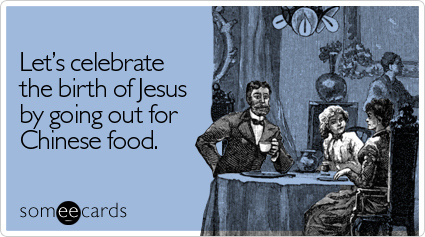 Some of the first songs I learned by heart were Christmas carols – the religious ones, not the cutesy ones with animal voices the radio overplays. This is because my first “debut” as an actress was as an angel in the town Christmas pageant when I was eight. I grew up loving those songs, envying lit-up trees, gobbling up cookies and eggnog. But what those festivities lead up to is always, without fail, the loneliest day of the year.
Some of the first songs I learned by heart were Christmas carols – the religious ones, not the cutesy ones with animal voices the radio overplays. This is because my first “debut” as an actress was as an angel in the town Christmas pageant when I was eight. I grew up loving those songs, envying lit-up trees, gobbling up cookies and eggnog. But what those festivities lead up to is always, without fail, the loneliest day of the year.
It was lonely when I didn’t have a lot of Jewish friends to commiserate with, but the ones I did have had their own plans with their Temple youth groups that I was not a part of. It’s lonely still when other Christians talk about the traditions that mean so much to them, but I can’t get in the same spirit because making traditions as an adult is harder; they don’t just happen. They are cultivated over a period of years, often starting from childhood. Making up traditions as a grown-up just isn’t as fun.
I was twenty-three years old the first time I decorated a tree, and ran around my boyfriend’s house on Christmas Day in red pajamas shouting “SANTA CAME! SANTA CAME!” because Jewish kids never got to do that.
It’s safe to say that Christmas, the season (ie: Advent) is completely separate from December 25th (which we know isn’t Jesus’ real birthday anyway). I loathe December 25th today as I did growing up: everything is closed; there are only Christmas movies on TV; no one around to hang out with. Sure, I could look at it as just another day to read in my favorite chair in my pajamas all day, but somehow it’s different when I choose to do that on my own volition, not because there’s nothing else to do instead. Run out of a kitchen staple, like milk or pretzels? Too bad, you’re stuck.
So yes, I am a Grinch who hates Christmas. But I have always loved Advent.
This year’s Advent will be my hardest, as my mid-faith crisis is in full swing. But the songs I learned as a child are still just as beautiful, particularly this line from O Holy Night: Chains shall he break/for the slave is our brother.
I have my concerns about how reasonable it is to believe that a virgin woman conceived a baby, and that baby was raised from the dead after he was crucified as an adult. I have so many questions the Bible doesn’t directly answer, but I love the Christmas season for reminding me of what matters most in this life. For a time, I have renewed faith that mankind is something unique and precious – not doomed from the beginning of existence. It takes a great deal of faith to believe that. It makes me wish that Advent could last year-round.
Since I have yet to find a new church home, it’s still Chinese food and a movie for me this year. Actually, the Chinese food is mandatory no matter what traditions might develop throughout my life. There may not be much spirituality in that, but there is camaraderie, and that to me is compatible with the meaning of Christmas.
Filed under: Religion Tagged: Christian culture, Christianity, Judaism

November 29, 2014
Hell or Cheeseburgers?
In the early stages of conversion, I thought I was exchanging Judaism – a set of rigid, outdated rules and regulations – for a faith that only required the humility of routine repentance. But I quickly found I had another big bone to pick with Christianity as a Jew: evangelism.
Oh, how evangelists bothered me. I resented not being able to walk to class at times without having some visiting preacher (they came frequently to my liberal party school) thrusting a pamphlet in my face, with bright red letters screaming “TURN OR BURN!” The audacity of some evangelists I’ve seen over the years just appalled me. And now that I, too, was Christian, evangelism suddenly became my responsibility. I just knew there was a catch somewhere. With Judaism, there were kosher laws. With Christianity, evangelism.
I would have rather given up cheeseburgers.
Weekly Cru meetings didn’t turn me into a sign-carrying preacher with a bullhorn on a sidewalk corner. In the staff’s defense, this is what they had to say about it: if you talked about Jesus to bolster your own superiority complex, you were doing it wrong. Evangelism – or as they called it, “sharing your faith”– is supposed to be an act of love. Christians should talk about Jesus the way most people talk about their significant others. I was supposed to gush about Jesus the same way I raved about The Hunger Games and Jane Austen.
Okay, I guess I could get on board with that.
In my experience, evangelism is done best when it is lived, not just preached. The gospel is supposed to transform one’s life in such a way that others can’t help but notice. At the same time, if I’m seen helping an elderly woman cross the street, or donating large sums of money to charity, no one will immediately assume it’s because I have Jesus in my heart.
But even after the gospel was condensed into bite-sized pieces so I could (kinda sorta) understand it, putting the message into action was another challenge. I can’t lie here – I was terrified of rejection, especially from the people my Cru friends thought needed to hear it most: my parents.
The older girls who took me under their wing told me gently, albeit sternly, that I needed to tell my unbelieving parents about Jesus – sooner rather than later. My dad apparently needed to hear it more, being a rebound cancer patient and all. “You just never know when the Lord might call him home, you know,” they would tell me, as casually as “Can you pass the chips?”
I broke out in a cold sweat at the thought of saying to my Jewish parents, “Hey Mom and Dad, do you mind sitting down so I can share the gospel with you?” Yeah, that would go over real well.
I don’t know why I wasn’t furious with those girls for being so insensitive. I guess I really thought they were only trying to help me.
“Just pray that the Holy Spirit will give you courage,” they said. “God will protect you!” they said.
Maybe they meant well, but they had no damn clue about reality. What they ended up doing was nearly scaring all the Jesus out of me, because if I wasn’t brave enough to confess my belief before my parents, how would I survive the Tribulation?
Truth be told, I felt more Jewish surrounded by gentiles than I ever did around other Jews.
My friend Bethany was convinced she had a foolproof method of breaking “the news” to my unsuspecting parents. “Just tell them that you’re pregnant,” she advised. “But before they can fall over in shock, that’s when you say ‘Just kidding! I’m not pregnant, I’m just a Christian.’” Ideally, they’d be so relieved that I wasn’t pregnant, believing in Jesus wouldn’t seem so bad.
I wish it were only an out-of-wedlock pregnancy I had to tell them about. That would have made my life much easier.
I started to have this reoccurring dream, clearly foreshadowing my “coming out” to the world as a Christian. In the dream, I was wearing a cross necklace I kept tucking under my shirt every time I passed a Jewish friend or family member. Just like Pinocchio’s nose every time he told a lie, the cross grew bigger every time I became self-conscious of it, to a point where I just couldn’t hide it anymore…and eventually everyone saw me for what I really was.
The only problem with that dream (actually, it’s quite a big problem) is that Jesus famously said anyone who denied him in life would be denied access to heaven. As intriguing a figure as he was to me, those words were haunting. They still haunt me to this day, and it baffles me that a religion with teachings as beautiful as redemption – that is, making broken things new again – and being “fearfully and wonderfully made” in God’s image also teaches a doctrine as frightening as eternal torture. Couldn’t God change the whole “system” if he didn’t want any of his children to go there? Or at least make his presence more obvious to skeptics? Is he not powerful enough to do something about that?
Some days my faith feels beautiful, and other times it feels like nonsensical madness. But even in my relationships with other people, there are qualities I love, and others I can’t begin to understand…and possibly never will. I wonder if God is any different, though it’s fascinating to me how that mystery factor draws some people in, and chases others away. “A God that’s small enough to understand isn’t big enough for my worship,” I’ve heard. But at what point is too much mystery a dealbreaker?
Excerpted from Confessions of a Prodigal Daughter
Filed under: Religion, Writing & Publishing Tagged: Author Sarahbeth Caplin, Campus Crusade for Christ, Christian culture, Christianity, Confessions of a Prodigal Daughter, hell, Judaism

November 24, 2014
Why Another Rape Book? Part II
So you may have heard that I’m working on another book, tentatively titled SHADES OF DOUBT (I’m not in love with the title, so I’m open to further suggestions). While I’m normally my own worst critic, I think this is my best work thus far, because for once I don’t have any specific “takeaway” for readers at the end. The central themes are rape accusations and the nature of consent – and I know readers will come away with a variety of opinions. That excites me because dialogue is the catalyst for social change. If we want to see a world where rape accusations are taken more seriously, and surrounding rape myths are peeled away, these discussions need to happen.
I love this book more than my others because there are no real conclusions. There is no outright moralizing. This book is also difficult to write – more so than Someone You Already Know – because I want my accused rapist to be a fully developed character, with a background and (gasp!) some good character traits. Because even rapists have them – they are not so easily typecast as villains like Disney characters are, being evil for the sake of being evil. They can be charming. They can be pillars of their communities. They can have loving, supportive families, good jobs, and loads of friends. That’s the sort of character I knew I wanted: one who intentionally comes off as an “every man,” thus making the accusation against him more shocking and difficult to prove.
My character Jordan is both easy and excruciating to create, because he is directly inspired by my own ex boyfriend. The one who raped, and walked. In the book, as in real life, the accused man does not see himself as a rapist. He refuses to consider any shred of validity in the charges against him because what the media portrays as rape, and what rape looks like in its most common form, do not always line up. Most victims are assaulted by people they know, and perhaps care for a great deal. While I don’t mean to suggest that all accused men are guilty – false accusations do happen – it’s incredibly frustrating to come across a person who does essentially admit to rape, but gets away with it because he wasn’t being “violent,” but rather “pushy” (does “boys will be boys” ring a bell here?).
I’ll let my friend Samantha explain it, from her post When Speaking to Men About False Accusations:
I’ve noticed a few things when I’ve talked to men about being “falsely accused.”
The first time I noticed this was a little over a year ago. At that point I was still really new to feminist conversations about rape culture and I was just beginning to familiarize myself with the data, and was sharing what I’d been learning. He brought up how he’d been “falsely accused” of raping a woman he’d been dating for a short time, and I did my best to not minimize what I saw as legitimate pain.
But, the conversation continued, and as he kept talking I realized something: the “false accusation” he felt so victimized by wasn’t actually false. In this particular case she hadn’t actually said he’d raped her, but that he’d assaulted her– and he had, by his own admission to me. He didn’t see it as assault; to him it was a small thing that he described with phrases like “being a little pushy.”
I didn’t have the chutzpah at the time to call him on it, but that conversation stuck with me.
It’s also usually played out that these men who are talking about being “falsely accused” of rape actually are rapists. They have a lot of justifications for why what they did wasn’t rape, I’ve found out. There are so many places online that are filled to the eyeballs-floating-in-shit brim with rape myths– they preach tactics like “those bitches actually do want your cock, you just have to convince them by giving it to them.”
We see these sorts of rape myths played out on a daily basis in our popular culture– Cersei and Jaime Lannister, for example. What many people saw as a “gray area” or “dubious consent” was actually just a rape myth. Cersei said “No” seven times , but Jaime assaulted her into shutting up and then raped her until she gave up being such a bitch and just admitted she actually did want it .
These are the sorts of things the men I’ve talked to who say they’ve been “falsely accused” tend to believe. There are victims of false accusations– I’m one of them. It should never happen to anyone.
However, I have yet to speak to a rapist– not even once – who sees that what they did was rape. They are delusional, but they have huge communities backing them up online, telling them all of the things they want to hear. It wasn’t rape– it was rough sex. It wasn’t rape– I just knew that she didn’t actually mean “no.” It wasn’t rape– I just got her drunk enough. It wasn’t rape– she was just unresponsive. It wasn’t rape– she was just crying because she was a virgin.
I hate that I found myself nodding along as I read this, because that is precisely what I was told. Back when I was dating *J, and before I changed my name (because the resulting depression, anxiety, and PTSD after my assault was so severe, I needed to start over), I heard too many times to count: You’ll change your mind if you just let me keep going, Sarah. You’ll like it if you just let me continue, Sarah. I didn’t clearly hear you say “no,” Sarah (because crying and shaking wasn’t obvious enough, apparently).
But I never once thought I was raped. He never thought he committed rape. Why would we think that? I loved him and thought I could trust him. He told me he loved me and cared for me deeply. He also joked about being a twenty-something virgin still, so “of course” he’d do what he could to get some action. And I was slowly being indoctrinated by Campus Crusade for Christ that men “can’t help themselves” around attractive women, so it all made sense to me.
If anything, I was the one at fault. I was the one who tried to look attractive for him. And even when I switched my tight jeans for sweatpants to curb his lust, I was still to blame, because didn’t I agree to see him in the first place? Didn’t I voluntarily let him into my house, into my room, with the door closed?
It’s bullshit. All of it. I used to lie awake at night, sweating and crying, thinking of J out there not realizing the full extent of what he did, and doing the same thing to other women. I did have my “moment” the day we broke up, when I told him “If you really loved me, you never would have forced me to do things I didn’t want to.” I never said the R-word, but I described what it meant. It made absolutely no difference because what I described is not how most people think of rape.
That needs to stop. That’s why I needed to write this book. And I’m fortunate to have a team of honest beta readers who let me know if there are places where my agenda is showing; where my accused rapist character is falling too much into Stereotypical Villain territory, and is losing some of his humanity. This book is not a form of revenge, and not so much a teaching tool, but hopefully an entertaining catalyst for discussion. Because chances are, most of us know a Jordan, or have met someone like him. And some of us have been Addie, the girlfriend, who is torn between wanting to believe the women stepping forward, but also doesn’t want to lose the man she loves.
Filed under: Feminism, Rape Culture, Religion, Writing & Publishing Tagged: Author Sarahbeth Caplin, Campus Crusade for Christ, Christian culture, Controversy, depression, Feminism, grief, rape culture

November 17, 2014
What a writing conference taught me about staying indie
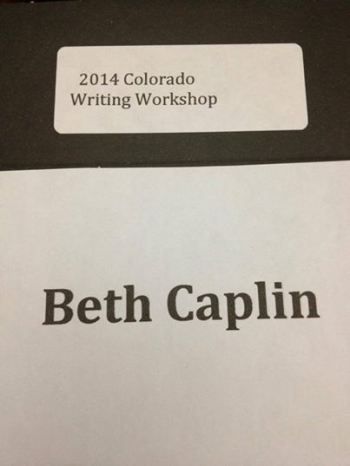 Last Saturday was my first writing conference: well worth every cent. A great portion of the afternoon was spent on comparing and contrasting self-publishing versus traditional publishing. While much of the information wasn’t new to me – such as the possibility of surrendering creative control of your work to a publisher – a few tidbits did stand out, pushing me more towards the side of staying indie than actively pursuing a traditional publishing contract.
Last Saturday was my first writing conference: well worth every cent. A great portion of the afternoon was spent on comparing and contrasting self-publishing versus traditional publishing. While much of the information wasn’t new to me – such as the possibility of surrendering creative control of your work to a publisher – a few tidbits did stand out, pushing me more towards the side of staying indie than actively pursuing a traditional publishing contract.
This doesn’t mean I’m dropping the idea of querying altogether. Reading my query letter to an agent – by far the most nerve-wracking part of the day – gave me that smidgeon of confidence I needed to submit it to other agents looking to represent my genre. The one I met with that day leans more toward traditional Young Adult (that is, characters who are still in high school or early college) than characters closer to thirty, which is the demographic my characters are in.
She also said my subject matter was “a little dark” (no surprise there), but it definitely appealed to her on a personal level. She told me my plot idea was “strong,” and even if her agency wasn’t looking for it, it is definitely a marketable concept. Wow! That’s definitely something I’ve never heard before, since my ideas tend to be difficult to categorize. I may not have gotten an offer for my entire manuscript, but that’s perfectly fine. I wasn’t expecting one, and just being told my idea was solid and marketable is my idea of a successful meeting.
That being said, here are some facts I learned about traditional publishing that are pushing me more towards staying indie:
The pay is not that great. The advance payment may be good, but an author selling his or her book for, say, $25 at Barnes & Noble will only make about $2 off it in royalties…and they may not even see that royalty for months after the purchase. Granted, this could all balance out if the book is a hit and thousands, if not millions, of people are buying copies. Compare that with the 70% royalty cut indies make, but they only sell a handful of books per month. It goes without saying that, to be a writer, you cannot be in it for the money alone. But as someone who does hope to write full-time, this is something to consider.
Really, there are two major requirements for being successful as an independent author: good writing and marketing savvy. You ARE a business owner if you choose to self-publish books, and it was good for me to hear that the bare minimal requirements of having a “media presence” are things I’m doing already: maintaining a website, blogging regularly, and being active on social media (Facebook, Twitter, Google Plus).
The common denominator for indies and traditional authors alike is that success (however you define it) takes time. An online platform is non-negotiable for both, if you want your books to be read. The success rate for traditional authors is sped up due to connections agents have that indies have to find on their own, but if time is the only major difference in successful book sales, I’m fine being patient and working that much harder on my own. I’m far too possessive of my creative powers to ever give them up. So if one day I am offered a traditional publishing contract, I will refuse to sign it if I am prohibited from self-publishing. An agent should be considered a business partner, and both he/she and the author have the readers’ interests at heart.
The good news is, publishers who are ONLY looking for debut authors are becoming archaic and outdated. Just like employers who refuse to hire people with tattoos will eventually realize that everyone and their grandmother is inked these days, agents and publishers will catch on that aspiring writers are turning to self-publishing at increased rates because anyone can learn how to do it. So when it comes to choosing future clients, there will be very little choice but to partner with authors wishing to become hybrids.
The hardest part of owning this type of business is having very little control of outside factors: what will readers want? What if Amazon crashes one day? How will I be able to stand out when there are so many platforms out there?
The bottom line is to just keep educating myself about the growing markets. And most importantly, to keep writing.
Filed under: Writing & Publishing Tagged: Author Sarahbeth Caplin, Facebook, Indie Author Life, self-publishing, Writing









